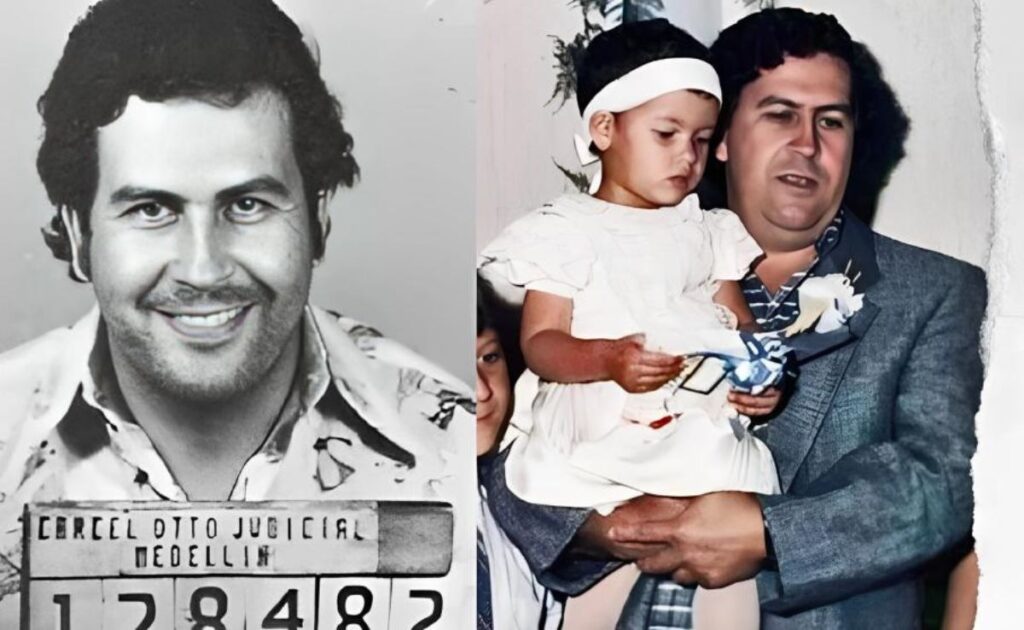Manuela Escobar: Age, Life, & Facts About Pablo Escobar's Daughter
Could the daughter of one of history's most notorious figures truly escape the shadow of her past? Manuela Escobar's life, born on May 25, 1984, offers a compelling case study in resilience and the enduring impact of legacy.
Born into a world of unimaginable wealth and privilege, Manuela Escobars early years were defined by a life of luxury, courtesy of her father, the infamous Pablo Escobar. Yet, this gilded existence was inextricably linked to a world of violence and crime. While the details of her life remain scarce, the whispers surrounding her suggest a childhood unlike any other. The young girl grew up in Colombia, shielded from the realities of her father's drug empire, but inevitably destined to be touched by its consequences. There are reports she spent her childhood with home schooling rather than public school like other kids of her age. Manuela's story is a compelling example of how an individual can navigate the complicated circumstances of a family history of crime. The life of Escobar's only daughter, Manuela, is not only a story of surviving the turmoil of her father's actions but also a reflection on how we perceive the children of infamous people, and the difficulties of achieving a normal life after being raised in the orbit of a notorious parent. The absence of a public persona is a testament to the extraordinary effort to live a private life, free from the constant exposure of media and public attention.
| Full Name | Juana Manuela Marroqun Santos |
| Also Known As | Manuela Escobar |
| Date of Birth | May 25, 1984 |
| Place of Birth | Medelln, Colombia (various sources say different places) |
| Age (as of December 2023) | 39 years old |
| Father | Pablo Escobar |
| Mother | Maria Victoria Henao |
| Siblings | Juan Pablo Escobar (now Sebastin Marroqun) |
| Marital Status | Unknown |
| Children | Unknown |
| Known For | Daughter of Pablo Escobar |
| Current Residence | Argentina (Reported) |
| Zodiac Sign | Gemini (Based on May 25th birthday) |
| Education | Homeschooled |
| Social Media | Not publicly available |
| Reference Website | Wikipedia |
The death of Pablo Escobar in 1993 marked a turning point. Manuela and her family were forced to flee Colombia, seeking refuge in various countries before eventually settling in Argentina. This escape from the violent world she had known was followed by a period of reinvention, as Manuela and her family changed their names to distance themselves from their past. In Argentina, she began to build a new life, attempting to leave behind the notoriety that had followed her. However, the past is never truly erased. The constant scrutiny and the weight of her lineage have undoubtedly shaped her life, influencing her choices and interactions. There is an air of mystery surrounding her current profession and private life. This is because there is no information about her available publicly.
Manuela's childhood, though privileged in a financial sense, was anything but ordinary. She was raised in a world of extreme wealth and protection, surrounded by luxury, but also by the constant threat of violence and the moral ambiguities of her father's actions. Accounts suggest she was deeply loved by her father, who indulged her every whim. There are several reports on her wishing a unicorn and wanting her to make her wish come true, which illustrates the level of her fathers affection for her. She was reportedly homeschooled, a measure likely taken to shield her from the outside world and potential dangers. This sheltered upbringing, however, also isolated her from the experiences of her peers, shaping her into a young woman with a unique and complex perspective on life.
The relocation to Argentina, while offering a physical escape, presented new challenges. Manuela and her family attempted to integrate into a new society, while simultaneously striving to leave behind the indelible mark of their past. The change of name to Juana Manuela Marroqun Santos and her brother's to Sebastin Marroqun, was an attempt to create a clean slate. They sought a life of anonymity. This quest for a normal life has been a central theme in Manuela's journey. Reports suggest that she has attempted to build a career and live a life independent of her father's legacy. Despite this, the shadow of her father continues to loom over her, and the public perception of her, shaped by the actions of Pablo Escobar, is a challenge she must constantly navigate.
The public's fascination with Manuela Escobar is a reflection of society's broader interest in the lives of those connected to notorious figures. The stories of people like her provide a different kind of perspective, allowing us to grapple with complex themes of family, identity, and the lasting impact of historical events. The scarcity of information available about her, her deliberate reclusiveness, only deepens the intrigue. Those who were associated with her father, including her, were exposed to the world's most destructive and violent side.
Manuela's life is not simply a historical footnote; it is a testament to the human capacity for resilience. While the details of her life remain shrouded in privacy, her existence serves as a potent reminder of the enduring legacy of the past. The story of Pablo Escobar's daughter prompts us to consider the challenges of forging an identity separate from one's family history. Manuela Escobar, now Juana Manuela Marroqun Santos, stands as a symbol of the enduring impact of her past and the power of individual choice in the face of overwhelming adversity.
The tale of Manuela Escobar is a reminder of the devastating effect of organized crime on both those directly involved and the innocent bystanders. The daughter of a drug lord, she has been confronted with enormous challenges, from her father's demise to the constant scrutiny that followed. Manuelas story highlights the ways in which violence and crime can affect not just immediate victims but also the families, and children. It offers an empathetic portrayal of a woman attempting to negotiate a new identity and future while constantly dealing with the burden of her past.
Manuela's story is also a reflection on the complicated concept of forgiveness. Can the sins of the father be forgiven? Can those who are born into a life of crime escape the stigma and change the future? The answers to these questions are not easy and may never be entirely known. Manuela's life is a continual struggle to create a sense of self, distinct from the legacy of her father. The constant questions are, What is it like to be the daughter of a notorious criminal? Can the children of criminals create a different future?
The fact that Manuela has largely stayed out of the public eye, coupled with the lack of detailed information about her, is not surprising. The media and public interest in her life were likely intense. She has avoided the spotlight in an effort to protect herself and her family. Her decision to live privately reflects both the difficulties she faced and her determination to live on her own terms, which shows her resilience. She chose to prioritize her family and privacy over public visibility, illustrating her effort to control the narrative of her life. This is a brave decision.
Manuela's experience also brings up the issue of identity and reinvention. Moving from Colombia to Argentina and changing her name was a deliberate act of transformation. It was an attempt to shed a past that was filled with violence and scrutiny. This process of reinvention is not easy. Manuelas ability to adapt and rebuild her life demonstrates the human capacity for change and growth. It highlights the possibilities of overcoming challenging events and the resilience of the human spirit.
The mystery surrounding Manuela Escobar also highlights the limits of our knowledge. It highlights how some stories will stay hidden. The fact that her life is mostly unknown serves as a reminder of the complexity of people's lives and experiences. The mystery encourages speculation, but also underlines the importance of respecting privacy and individual agency, especially for those who have already faced extreme challenges.
Manuelas story is an important reminder of the long-lasting effect of crime. Its a reminder of the value of empathy and the importance of understanding the experiences of individuals, particularly in the shadow of difficult pasts. By learning about Manuela Escobar's life, we gain a deeper insight into the consequences of crime and the complex reality of those who were affected by it. She has inspired us to consider the lasting impact of family and identity. Her story emphasizes the difficulty of overcoming the past and the resilience required to create a new life. In the case of Manuela Escobar, what is known provides only a glimpse into a story still being written, a testament to the endurance of the human spirit in the face of an extraordinary past.
Manuela Escobar's story, with all its unanswered questions and veiled details, continues to fascinate and challenge our perceptions of history, identity, and the human spirit. Its a story of a girl, a woman, and a daughter. A life lived in the shadow of infamy.


